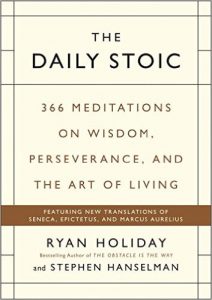What Is Stoicism?
Stoicism is one of the many branches of ancient Greek Philosophy. It was invented around 300 BC by a man called Zeno who, despite losing a lot in his life, kept focusing on the positive in his life. Stoicism is indeed a way of life that resolves around three main disciplines: (1) controlling our perception, (2) directing our action for good, and (3) accepting what is outside our control.
It is about teaching yourself self-control and discipline as a method of overcoming negative emotions in your life. It is not about getting rid of emotions completely, but of being in control of these emotions (instead of having them control you). Once a person is able to achieve that state of mind, then they can be disciplined and free from the suffering this world can cause (thus why dictionaries define “Stoic” as a person who can endure pain or hardship without showing their feelings or complaining).

Stoicism became very mainstream ~250 years after Zeno when it was practiced by Marcus Aurelius (Emperor of the Roman Empire from 161 to 180 AD), Epictetus (Slave turned to Philosopher; 55 to 135 AD), and Seneca the Younger (Roman Playwright; 4 BC to 65 AD). Stoicism back then was being practiced by everyone, regardless of age, sex, occupation, social rank. But just like the many things in history, it died away with time. However, thanks to authors like Ryan Holiday, modern stoicism is becoming famous again or at least its being given the attention it deserves. Ryan published the book “The Daily Stoic”, which inspired me to come up with this blog and my LinkedIn page to share stoic readings with others.
Ryan’s blog, Daily Stoic, summarizes Stoicism as a way that of life that:
- Reminds us that we do not control external factors, but we can still control ourselves and our reaction to externalities.
- Reminds us that we are just a small dot in this very large universe, and that our lifetime in this world is very brief.
- Teaches us how to be in control of ourselves and become better people through that.
- Reminds us that the source of dissatisfaction lies in our dependency on our senses rather than our logic.






